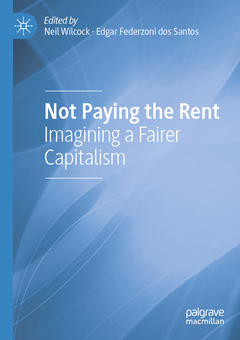Description
Not Paying the Rent, 1st ed. 2021
Imagining a Fairer Capitalism
Coordinators: Wilcock Neil, Federzoni dos Santos Edgar
Language: English
Subjects for Not Paying the Rent:
Keywords
rule-based globalisation; convoy model of globalisation; prosperous economy; equitable society; Brazil's economy; open capitalist economies; democratic principles; inquality; multilateralism; The World Bank; UNCTAD; humanitarian capitalism; reforming capitalism; United Nations; international orgnisations
Publication date: 09-2022
192 p. · 14.8x21 cm · Paperback
Publication date: 09-2021
192 p. · 14.8x21 cm · Hardback
Description
/li>Contents
/li>Biography
/li>Comment
/li>
This is a conversational book with chapters directly followed by responses from experts. The main authors propose that the failure in development is not due to capitalism but rather rentism, which is earnings based on political rather market returns. Rent prevents development and ingrains social and economic inequalities. Using the case study of Brazil?s economic development, it is shown how development fails because policies Brazil and other low to middle-income countries promote do not overcome the main obstacle to development - rent. The overcoming of rent would occur within a model of globalisation whereby the advanced economics still prosper concurrently as the poorest countries grow, all underpinned by international organisations defending a rule-based globalisation.
Presents Brazil as a case study of an emerging economy with cross-cutting political economic themes
Re-articulates the growing recognition of economic ills due to rent, marginality, and under-consumption
Explains how international organizations should change as a result of the emergence of new economies on order to foster a unified global economy
Speech format allows for a more direct, engaging and lively discussion between author and reader




